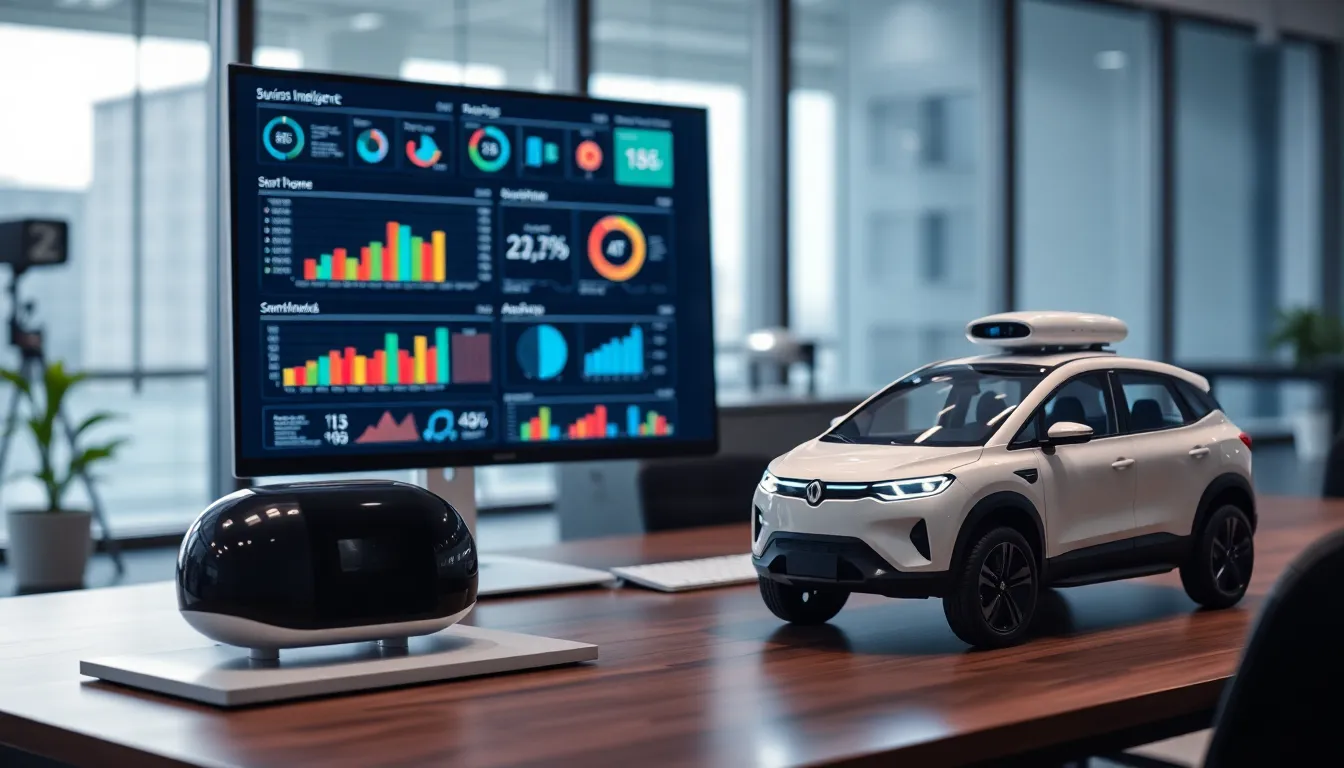In a world where your smartphone can outsmart you, AI-driven applications are the new superheroes of technology. They swoop in to save the day, making life easier, faster, and a lot more fun. Whether it’s predicting your pizza cravings or helping you find your lost keys, these applications are transforming the mundane into the extraordinary.
Imagine having a personal assistant that never sleeps, never eats, and definitely never complains about your questionable taste in music. With AI-driven apps, that dream is a reality. They’re not just tools; they’re your partners in crime, ready to tackle everything from scheduling your meetings to suggesting the perfect Netflix binge. Dive into the world of AI and discover how these clever creations are revolutionizing the way we live, work, and play.
Table of Contents
ToggleOverview of AI-Driven Applications
AI-driven applications serve as transformative tools in daily life. They enhance tasks ranging from scheduling to entertainment recommendations.
Definition and Importance
AI-driven applications utilize artificial intelligence to perform tasks that typically require human intelligence. They analyze data, learn from user behavior, and adapt to individual preferences. Importance stems from their ability to increase efficiency in various sectors. In business, these applications streamline operations by automating repetitive tasks. Healthcare benefits from improved diagnostics powered by AI algorithms. Overall, these tools significantly influence productivity and user experience across personal and professional settings.
Key Features
Key features of AI-driven applications often include machine learning capabilities and natural language processing. Machine learning allows applications to analyze vast amounts of data and identify patterns. Natural language processing enhances user interaction by understanding and responding to human language. Additionally, many applications offer personalization, tailoring content and recommendations to individual users. Real-time data processing enables instant responses to user queries or actions. Security features, such as encryption and authentication, ensure user data remains protected. These attributes make AI-driven applications indispensable in today’s technology landscape.
Types of AI-Driven Applications

Various categories of AI-driven applications showcase their transformative abilities across different sectors. Each type utilizes artificial intelligence to enhance efficiency and improve user interactions.
Business Intelligence Tools
Business intelligence tools leverage machine learning to process and analyze data. These applications provide insights that ensure informed decision-making. Companies utilize predictive analytics for market trends, driving strategies that maximize success. Dashboards and reporting features improve data visualization, aiding users in identifying key performance indicators. Automation within these tools helps streamline reporting processes, saving time and reducing errors. Overall, business intelligence tools facilitate better strategic alignment and operational efficiency.
Healthcare Innovations
Healthcare innovations utilize AI-driven applications to improve patient outcomes and streamline workflows. Telemedicine platforms enhance communication between healthcare providers and patients, offering consultations from remote locations. Predictive analytics assists in patient diagnosis and treatment planning, based on historical data and individual health records. Moreover, personalized medicine embraces AI to tailor treatments according to patient genetics and lifestyle factors. Robotics in surgical procedures enhances precision, minimizing recovery times. Such innovations revolutionize healthcare by enhancing accessibility, efficiency, and patient care.
Smart Home Devices
Smart home devices integrate AI technology to create seamless living environments. Voice-activated assistants like smart speakers respond to commands, controlling lighting, security, and appliances. Energy management systems analyze usage patterns, optimizing power consumption for efficiency. Home security devices utilize facial recognition to provide enhanced safety, alerting users of potential threats. Additionally, smart thermostats learn user preferences, adjusting temperatures automatically. Overall, these devices contribute to convenience, security, and energy efficiency in daily life.
Autonomous Vehicles
Autonomous vehicles rely on AI algorithms to navigate and operate safely. Sensors, cameras, and radar detect surroundings, allowing vehicles to respond to obstacles and traffic conditions. Real-time data processing supports route optimization, enhancing travel efficiency. Passengers benefit from increased safety features, reducing accident risks while promoting a smoother ride. The integration of machine learning helps improve vehicle performance over time, adapting to user behavior and road conditions. As these technologies advance, autonomous vehicles promise to reshape transportation landscapes.
Benefits of AI-Driven Applications
AI-driven applications deliver numerous advantages that enhance various aspects of life and work. Significant benefits include enhanced efficiency, improved decision making, and a personalized user experience.
Enhanced Efficiency
AI-driven applications streamline routine tasks, reducing time spent on manual work. Automation of processes allows businesses to allocate resources more effectively. In healthcare settings, AI can quickly analyze patient data, improving accuracy in diagnoses. Faster operations lead to increased productivity and reduced operational costs in various sectors. Businesses focusing on efficiency find that AI technologies optimize workflows and eliminate repetitive tasks.
Improved Decision Making
Data analysis becomes more powerful through AI-driven applications, providing valuable insights for decision makers. Organizations leverage machine learning algorithms to anticipate trends and interpret complex datasets. With access to real-time data, businesses can adapt strategies promptly based on emerging information. In finance, AI enhances risk assessment, allowing for calculated investments. Enhanced capabilities lead to strategic decisions that align with overall goals.
Personalized User Experience
User satisfaction increases with AI-driven applications through tailored content and interactions. Advanced algorithms assess user behavior, preferences, and needs, offering relevant recommendations. Personalized learning in educational apps allows students to progress at their own pace, improving outcomes. Additionally, entertainment platforms suggest options based on viewing history, enriching user engagement. By creating customized experiences, AI applications foster loyalty and enhance overall customer satisfaction.
Challenges and Considerations
AI-driven applications present several challenges and considerations that warrant attention. Navigating these complexities ensures effective implementation and enhances user experience.
Ethical Concerns
Ethical implications arise from the use of AI-driven technologies. Bias in algorithms can lead to unfair treatment of individuals. Transparency in AI decision-making processes remains crucial for fostering trust among users. Organizations must prioritize fairness and accountability by regularly auditing their AI systems. Developers play a significant role in implementing guidelines that ensure ethical use and minimize discrimination.
Data Privacy Issues
Data privacy concerns become paramount when discussing AI applications. Personal information often underpins the functioning of these systems. Consequently, safeguarding sensitive data should be a primary focus for developers. Compliance with regulations like GDPR and CCPA enhances user protection. The challenge lies in striking a balance between personalized experiences and safeguarding user privacy.
Technological Limitations
Technological limitations can hinder the effectiveness of AI-driven applications. Some applications may struggle with processing vast datasets efficiently. Others may lack the ability to understand complex human emotions, leading to misinterpretations. Continuous advancements in machine learning and natural language processing are vital for overcoming these constraints. Developers must recognize these challenges and work diligently to enhance system capabilities.
Future Trends in AI-Driven Applications
AI-driven applications continue to evolve, showcasing exciting possibilities for the future. Anticipated developments include the integration of cutting-edge technologies that reshape user experiences and redefine industry standards.
Emerging Technologies
Quantum computing promises to enhance AI capabilities significantly. With its immense processing power, quantum systems can analyze complex datasets faster than traditional methods. Edge computing decentralizes data processing and reduces latency, enabling real-time decision-making at the source. Natural language processing advancements will further improve interactions, allowing applications to understand context and sentiment more accurately. As these technologies emerge, they will enhance the sophistication of AI-driven applications and solve more intricate challenges.
Industry Predictions
Experts anticipate substantial growth in AI applications across multiple sectors. By 2025, investment in AI technologies is expected to reach $126 billion globally. Industries like healthcare will likely see greater patient involvement via personalized medical solutions. Retailers may leverage AI for inventory management and enhanced customer experience. Automation of routine tasks across sectors will also increase, streamlining operations and maximizing productivity. In this landscape, innovative AI-driven applications will play a crucial role in driving efficiency and competitiveness.
AI-driven applications are reshaping the way individuals and organizations interact with technology. Their ability to learn and adapt enhances user experiences and boosts productivity across various sectors. As these applications continue to evolve, they’ll likely address existing challenges while paving the way for innovative solutions.
The future promises even greater integration of AI technologies, with advancements in machine learning and data processing capabilities. Businesses and consumers alike will benefit from the personalized interactions and streamlined operations these applications provide. Embracing this transformation will be crucial for staying competitive in an increasingly digital world.



